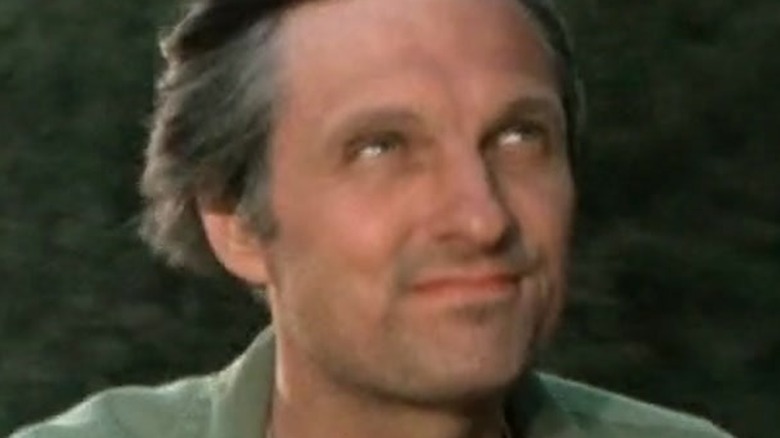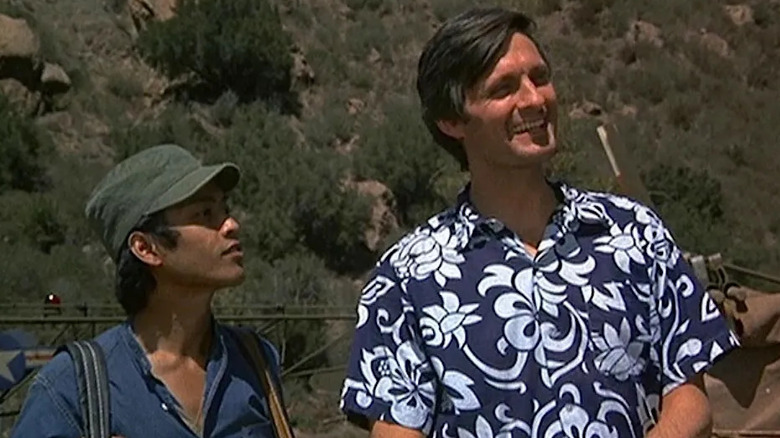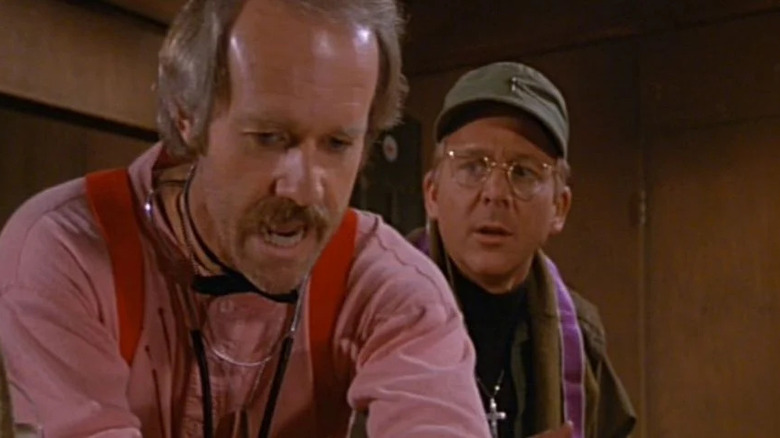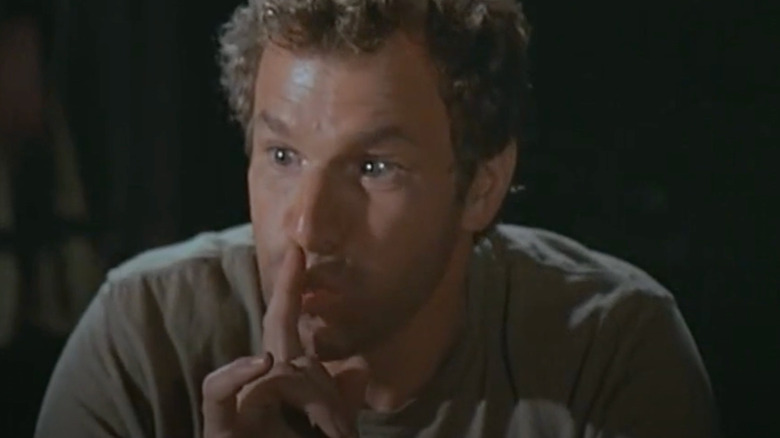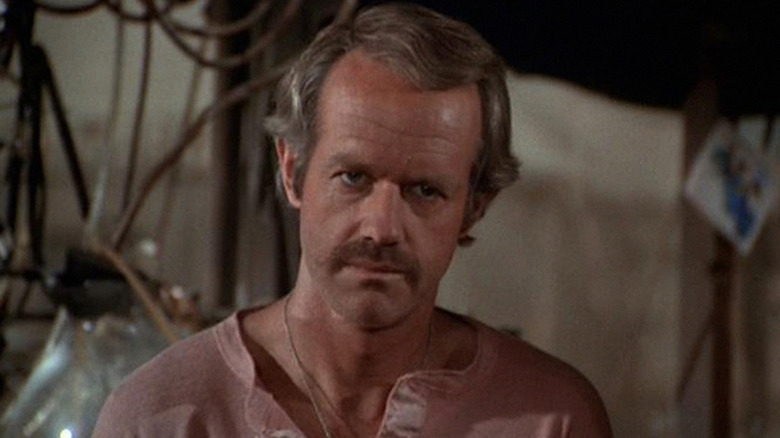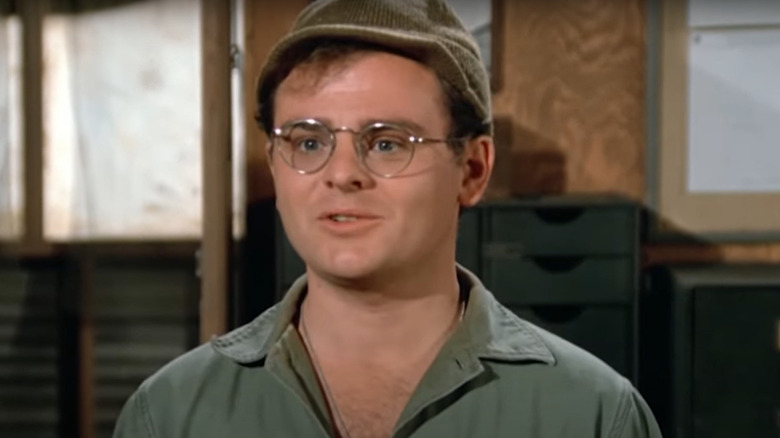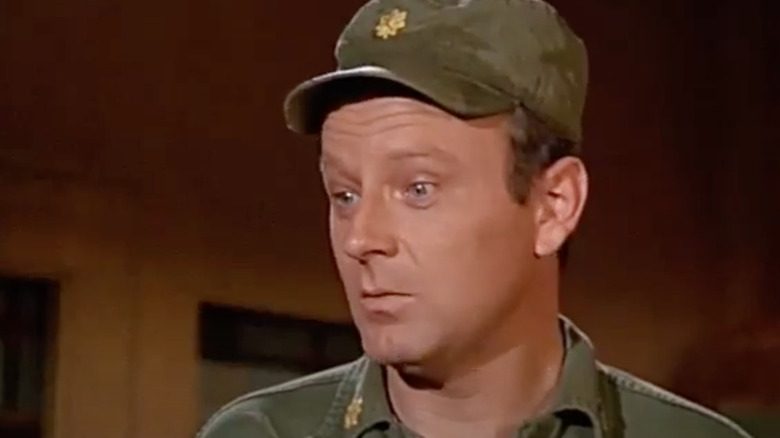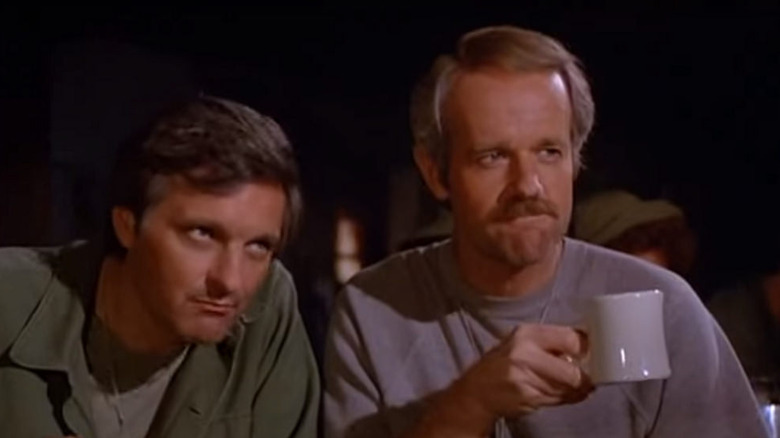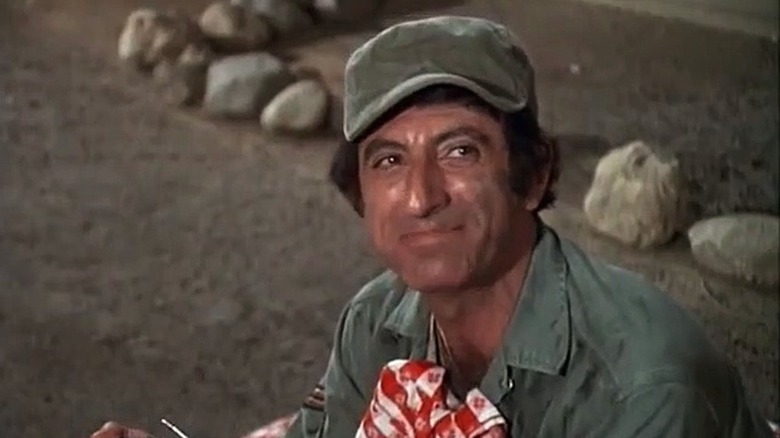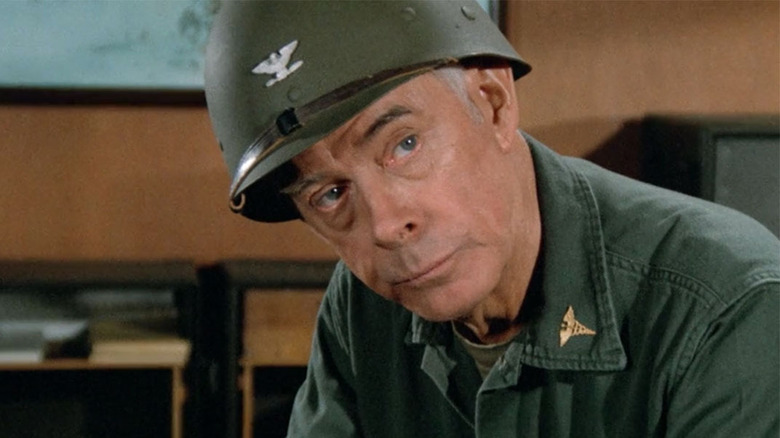The Biggest Unanswered Questions In MASH
Decades after it went off the air, "M*A*S*H*" continues to be one of the most celebrated television series in American history. Adapting Richard Hooker's 1968 novel "MASH: A Novel About Three Army Doctors," which is also the basis for a 1970 feature film, the show follows a U.S. Army mobile surgical hospital throughout the Korean War. Starring Alan Alda as combat surgeon Captain Benjamin Franklin "Hawkeye" Pierce, "M*A*S*H*" blends humor with high-stakes drama as the characters deal with the horrors of war firsthand on a daily basis. After the series concluded in 1983, there were still plenty of unresolved questions regarding the show's story and behind-the-scenes details.
Here are the biggest open questions from the "M*A*S*H*" television show that continue to remain glaringly unanswered years later, from inconsistencies with the series' timeline to its presumed connections to its multiple spinoffs, and the ominous possibility that it all takes place in the imagination of a little kid from a completely different show.
Whatever happened to Ho-Jon?
As is the case in the preceding novel and film, Hawkeye and "Trapper John" McIntyre (Wayne Rogers) had their own personal assistant among the Korean locals. Named Ho-Jon (Patrick Adiarte), the character appears sporadically throughout the "M*A*S*H*" television series and expresses aspirations to attend medical school in the United States. However, after the first season, Ho-Jon abruptly disappears from the show's cast entirely without any explanation.
The novel and movie have Ho-Jon drafted into the Republic of Korea's army where he's wounded in the novel and killed in the movie. We don't know for sure, but the Ho-Jon of television might've had a happier ending. The biggest hint to Ho-Jon's television fate lies within the series premiere, with Hawkeye and Trapper John conspiring to raise the funds necessary for Ho-Jon to travel to America and attend medical school. It can be inferred that Ho-Jon made good on this professional aspiration, though there is no mention of it after the character quietly vanishes from the show.
How will B.J. and his family react to their reunion?
In contrast to other main characters like Trapper John and Henry Blake (McLean Stevenson) who repeatedly cheat on their wives while stationed in Korea, B.J. Hunnicutt (Mike Farrell) is completely faithful. After being drafted into the army, B.J. leaves his young wife Peg (Catherine Bergstrom) and newborn daughter Erin back at their home in California and writes to his wife constantly. Though B.J.'s marriage endures the duration of the Korean War, the combat surgeon changes considerably since the start of his assignment to the 4077th.
One of the biggest existential crises that B.J. faces while stationed in Korea occurs when Erin mistakes Walter "Radar" O'Reilly (Gary Burghoff) for her father. The realization that his own daughter never knew him and all the crucial time he lost with his family takes an especially heavy toll on B.J.'s psyche. Though B.J. looks forward to reuniting with his family by the series' end, the incident with Radar reminds him how much they've changed in his absence.
Is Trapper John, M.D. canon to the TV show?
In between the third and fourth seasons of "M*A*S*H*," actor Wayne Rogers left the cast, and his character was written out of the show offscreen in the Season 4 premiere. There is little mention of Trapper John and his activities home from the Korean War following his departure, but an iteration of the character stars in the television series "Trapper John, M.D." But while the spinoff show features a protagonist based off the literary character, it is never clear if it shares a continuity with the "M*A*S*H*" of television.
Airing for seven seasons from 1979 to 1986, "Trapper John" takes place 28 years after the Korean War and stars Pernell Roberts as the title character working at a San Francisco hospital. While the "Trapper John" series premiere features photos from the "M*A*S*H*" television series, it possesses a considerably different tone, playing out more like a drama than a sitcom. References to "M*A*S*H*" grow increasingly rare over the course of "Trapper John," leaving the question of whether the two shows are related unresolved years later.
Are M*A*S*H* and St. Elsewhere connected?
Another series that may be set within the continuity of "M*A*S*H*" is the medical drama "St. Elsewhere." Airing for six seasons from 1982 to 1988, "St. Elsewhere" follows a group of doctors working at a poorly maintained hospital in Boston. While not explicitly linked to "M*A*S*H*" at first glance, main character Mark Craig (William Daniels) claims to have been drinking buddies with B.J. Hunnicutt while serving alongside him in the Korean War.
The reference is made in the Season 4 premiere "Santa Claus Is Dead," but since it's only made in passing, it's hard to tell how seriously we should take it. This connection is made all the more questionable by the "St. Elsewhere" series finale, which reveals the entire plot and characters of the show are a young boy's vivid fantasy. This suggests that the boy could have similarly fantasized the world of "M*A*S*H*," or perhaps he watched it on television and incorporated a few "M*A*S*H" references into his hospital fantasy. Who can say?
Whatever happened to Radar?
Actor Gary Burghoff — the only cast member from the 1970 "M*A*S*H" movie who reprised his role for the 1972 TV series – decided to leave the show in Season 8. In a two-part episode, Radar returns to help run his family farm in Iowa after the sudden death of his uncle. Though Radar's absence was certainly felt at the 4077th, his commanding officer and father figure Sherman Potter (Harry Morgan) sends a Korean farmer to Iowa to help with Radar's farm.
The sequel series "AfterMASH" provides more details on Radar's post-war life, with the character marrying a young woman named Sandy in the presence of several of his old friends from the 4077th. However, the proposed spinoff series "W*A*L*T*E*R*" revealed a much more tragic fate for the Army veteran. Evidently Radar's family farm failed, his wife left him, and Radar contemplated suicide before joining the police. Unsurprisingly, the spinoff was not picked up for a series order, with the pilot airing on CBS in July 1984 as a TV special before fading into obscurity.
If you or anyone you know is having suicidal thoughts, please call the National Suicide Prevention Lifeline at 1-800-273-TALK (8255).
Was Frank telling the truth about his promotion?
One of the central rivalries for much of the first half of "M*A*S*H*" is between Hawkeye and obnoxious superior officer Frank Burns (Larry Linville), along with his partner Margaret Houlihan (Loretta Swit). Smug, incompetent, and overbearing, Frank and his fellow combat surgeons clash often, as Frank is extremely jealous of Hawkeye's status as the 4077th's chief surgeon. However, following Margaret's marriage to another man at the end of the fifth season, Frank was written out of the show at the start of Season 6.
The two-part Season 6 premiere reveals that Frank suffered a mental health episode while on leave, resulting in him being transferred back to the United States for a full psychiatric evaluation. While the 4077th is overjoyed by Frank's reassignment, Frank calls Hawkeye personally to notify him he has been cleared by doctors and promoted to a cushy position stateside. Given Frank's penchant for inflating the truth for his own benefit and the pettiness of his rivalry with Hawkeye, it is unclear if Frank was being honest or just lying to get the last laugh.
If you or someone you know is struggling with mental health, please contact the Crisis Text Line by texting HOME to 741741, call the National Alliance on Mental Illness helpline at 1-800-950-NAMI (6264), or visit the National Institute of Mental Health website.
Do Hawkeye and B.J. ever reunite?
The last conversation in "M*A*S*H*" is between Hawkeye and B.J., with the two best friends bidding each other farewell before departing separately from the 4077th for good at the Korean War's end. As the men part ways and prepare to return stateside, Hawkeye and B.J. promise to reunite eventually in the United States. However, it is unclear if this vow is ever actually fulfilled. The spinoffs and continuation novels leave the matter unaddressed.
"AfterMASH" reveals that Hawkeye considers abandoning medicine altogether before pursuing a career in pediatrics, while B.J. is never directly referenced in the series at all. Author Richard Hooker wrote two novels as sequels to his original "M*A*S*H*," but since B.J. was created specifically for the TV series, he's absent from the literary continuation. Of all the main characters on the show, B.J.'s postwar life and his final promise to Hawkeye remain glaringly unresolved open questions.
Can Klinger actually talk to dead people?
Maxwell Klinger (Jamie Farr) was introduced as a constant source of comic relief in the early seasons of "M*A*S*H*" who attempts to get himself declared mentally unfit for military service and sent home. Following Radar's departure from the 4077th, Maxwell replaces him as the unit's company clerk and begin to take his work around the base more seriously. A little while after Klinger takes on this additional responsibility, he starts communicating with the afterlife in the Season 10 episode "Follies of the Living — Concerns of the Dead."
While suffering from an intense fever, Klinger repeatedly speaks with the spirit of a recently killed American soldier who doesn't believe he's dead. After recovering from his fever, Klinger mentions the soldier's name to the personnel, and is surprised to learn that no one has ever heard of him. Given Klinger's fever and the occasional explorations of mental health on "M*A*S*H*," the entire exchange was likely imagined. However, the final twist of no one recognizing the soldier raises unanswered questions.
How did the timeline get so convoluted?
The Korean War formally saw a cessation of hostilities on July 27, 1953, with the signing of the Korean War Armistice Agreement a little over three years after the war began in June of 1950. By contrast, "M*A*S*H*" ran for more than 250 episodes across eleven seasons all set within the duration of the conflict. This disparity in time elapsed between the show and the war it was depicting led to certain elements of its presumptive timeline becoming contradictory and convoluted.
While the series begins at the start of the Korean War in 1950, Season 4 begins with B.J. and Colonel Potter both newly stationed at the 4077th in September of 1952. However, the Season 9 episode "A War for All Seasons" tells us Potter was stationed at the base at least as early as New Year's Eve, 1950. Discrepancies sometimes even appear among characters' descriptions of their own ages — Potter claims to have lied about his age to serve in World War I, however the Season 10 episode "Pressure Points" places him as in his 20s during World War I.
What's the deal with Hawkeye's marital status?
In the "M*A*S*H*" novel and film, Hawkeye is a married man with his wife living back with the rest of his family in Maine. In the novel, Hawkeye is a steadfastly faithful husband, whereas the movie has him regularly indulge in extramarital affairs to deal with the stress of being in the war. However, while Hawkeye remains a habitual womanizer in the television series, his marital status is depicted inconsistently.
In the series premiere, Hawkeye claims to be engaged to an unidentified woman back home but declines to provide any additional details. The Season 4 episode "The More I See You" has Hawkeye reunite with an old flame, with the couple revealed to have been in a common-law marriage before separating. Hawkeye's amorous escapades have always been an especially messy part of his personal life, but it was never clear if he had someone other than his dad waiting for him back home.
